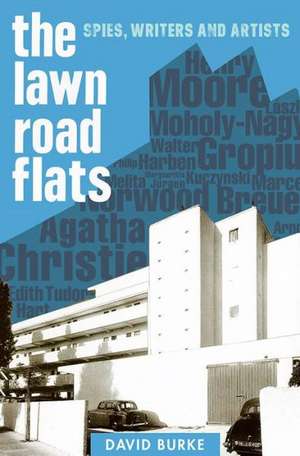The Lawn Road Flats – Spies, Writers and Artists: History of British Intelligence
Autor David Burke, Michael Middekeen Limba Engleză Hardback – 19 mar 2014
There were 32 Flats in all, and they became a haunt of some of the most prominent Soviet agents working against Britain in the 1930s and 40s, among them Arnold Deutsch, the controller of the group of Cambridge spies who came to be known as the "Magnificent Five" after the Western movie The Magnificent Seven; the photographer Edith Tudor-Hart; and Melita Norwood, the longest-serving Soviet spy in British espionage history.
However, it wasn't only spies who were attracted to the Lawn Road Flats, the Bauhaus exiles Walter Gropius, Lszl Moholy-Nagy and Marcel Breuer; the pre-historian V. Gordon Childe; and the poet (and Bletchley Park intelligence officer) Charles Brasch all made their way there. A number of British artists, sculptors andwriters were also drawn to the Flats, among them the sculptor and painter Henry Moore; the novelist Nicholas Monsarrat; and the crime writer Agatha Christie, who wrote her only spy novel N or M? in the Flats. The Isokon buildingboasted its own restaurant and dining club, where many of the Flats' most famous residents rubbed shoulders with some of the most dangerous communist spies ever to operate in Britain. Agatha Christie often said that she invented her characters from what she observed going on around her. With the Kuczynskis - probably the most successful family of spies in the history of espionage - in residence, she would have had plenty of material.
DAVID BURKEis a historian of intelligence and international relations and author of The Spy Who Came In From the Co-op: Melita Norwood and the Ending of Cold War Espionage (The Boydell Press, 2009).
| Toate formatele și edițiile | Preț | Express |
|---|---|---|
| Paperback (1) | 136.08 lei 3-5 săpt. | +17.92 lei 6-10 zile |
| Boydell and Brewer – 24 oct 2019 | 136.08 lei 3-5 săpt. | +17.92 lei 6-10 zile |
| Hardback (1) | 276.52 lei 3-5 săpt. | |
| BOYDELL PRESS – 19 mar 2014 | 276.52 lei 3-5 săpt. |
Preț: 276.52 lei
Nou
Puncte Express: 415
Preț estimativ în valută:
52.92€ • 57.46$ • 44.45£
52.92€ • 57.46$ • 44.45£
Carte disponibilă
Livrare economică 02-16 aprilie
Preluare comenzi: 021 569.72.76
Specificații
ISBN-13: 9781843837831
ISBN-10: 1843837838
Pagini: 309
Ilustrații: 32 illustrations
Dimensiuni: 164 x 241 x 28 mm
Greutate: 0.84 kg
Editura: BOYDELL PRESS
Seria History of British Intelligence
ISBN-10: 1843837838
Pagini: 309
Ilustrații: 32 illustrations
Dimensiuni: 164 x 241 x 28 mm
Greutate: 0.84 kg
Editura: BOYDELL PRESS
Seria History of British Intelligence
Notă biografică
David Burke
Cuprins
Foreword - Prologue Remembrance of Things Past, Hampstead Man among `The Modernists' 'National Planning For The Future' and the arrival of Walter Gropius 1935: `Art crystallises the emotions of an age.' Musicology, and the art of Espionage Arnold Deutsch, Kim Philby and Austro-Marxism The Isobar, Half Hundred Club and the arrival of SONYA The Plot Thickens: Jurgen Kuczynski, Agatha Christie and Colletts Bookshop Refugees, The Kuczynski Network, Churchill and Operation Barbarossa Klaus Fuchs, Rothstein once more, and Charles Brasch Vere Gordon Childe The New Statesman, Ho Chi Minh, and The End of an Era Epilogue Bibliography







